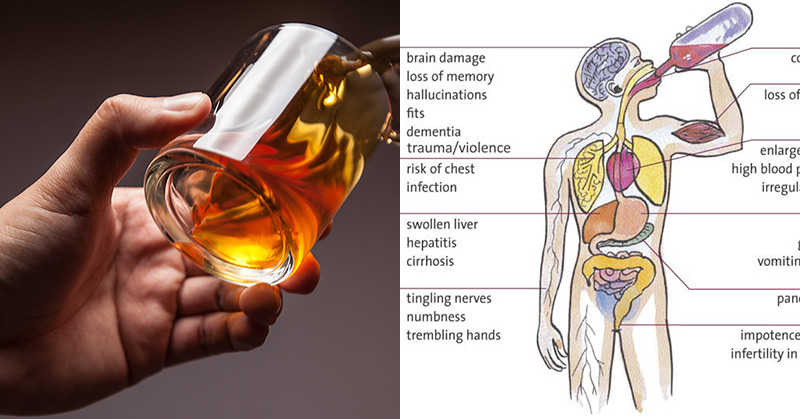Most of us regularly have a drink after a tough day at work, and if you are one of those who love to have an occasional drink, you will find this article very useful.
Apparently, the findings of a recent study suggest that even moderate alcohol consumption can increase the risk of cognitive decline.
The team of researchers from the University of Oxford and University College London, led by Anya Topiwala, a senior clinical researcher, and consultant psychiatrist, analyzed the effects of moderate alcohol consumption on brain structure and function.
Their study was published in the BMJ, researched 550 men and women in the UK with an average age of 43, all not “alcohol dependent” for thirty years.
Participants were analyzed on their weekly alcohol intake and their cognitive performance.
The findings indicate that higher alcohol intake led to increased risks for hippocampal atrophy, a condition characterized by degeneration of the brain cells, which causes memory loss and disorientation.
The ones at a higher risk were those that were consuming more than 30 units of alcohol a week, which would be the equivalent of 2.5 bottles of beer or more. Participants who drank moderately had 3 times the odds of developing right-sided hippocampal atrophy.
According to researchers:
“Alcohol might represent a modifiable risk factor for cognitive impairment, and primary prevention interventions targeted to later life could be too late”.
Moreover, the effects of alcohol do not wear off after a good night’s sleep. These effects vary depending on many factors, such as:
- The amount of alcohol consumed and the frequency of drinking
- The age that the individual started drinking, and the duration of this habit
- General health
- The age, gender, genetic background, level of education, and family history of alcoholism
- Whether one is at risk of prenatal alcohol exposure
These are the effects of alcohol on the brain and its function:
Brain Damage
Individuals who have been drinking large amounts of alcohol for a long period of time have an increased risk of long-term brain damage.
Blackouts and Memory Lapse
Even one alcoholic drink might cause impairment in memory, and the level of impairment raises with the amount of alcohol consumed. When a person drinks large amounts of alcohol in a short time, especially on an empty stomach, s/he experiences a blackout.
During it, the person may be completely unaware of things that happen and does not remember the episode the following day.
Brain Disorders
Studies have shown that about 80% of alcoholics are Thiamine, or vitamin B1, deficient, and this leads to serious brain disorders like Wernicke-Korsakoff Syndrome.
This chronic and debilitating syndrome is life-altering, as it is manifested by persistent learning and memory issues, forgetfulness, frustration, and coordination issues. Also, these patients face difficulties to process new information as well.
Alcohol severely affects our body, leading to:
- Diabetes
- Infectious Disease
- Liver and pancreas disease
- Cancer
- Neuropsychiatric Disease
- Unintentional and intentional injury
- Cardiovascular Disease
Therefore, you need to become able to control alcohol intake and stop before it is too late.
Here are some tips to help you:
- Eat before you have a drink
Your body will be able to prevent many of the negative effects of alcohol if you do not drink on an empty stomach. Also, you will reduce the risk of a blackout or memory lapse.
- Alternate alcoholic drinks with water
Remember to remain hydrated while drinking alcohol. Alternate one alcoholic drink and one glass of water in order to get the right amount of H2O.
- Count your drinks
Make sure your glass is not filled up until you have completely finished it, and count your drinks, in order to keep a track of their number. In this way, you won’t go over the normal amount.
- Be assertive-don’t drink more than you intend to
It would be useful to make a plan about your drinks before you go out, and even though there will be friends who would like to persuade you to drink at least one more, be determined not to cross the limit.
- Know your limits
You should learn the amount of alcohol that is just before too much for you, and stick to it. You can even figure your limit out with the help of a blood alcohol level calculator.
- Avoid “shots” or “chugging”
Your body and mind are severely damaged by quick drinking of large amounts of alcohol, so you should stay away from “shorts” and “chugging”.
- Do not confuse large measures of alcohol with standard measures
Consider the amount of alcohol in the glass when counting your glasses, as it might not be the same as a standardly- sized pour from a restaurant.
We all have the right to choose whether we will enjoy alcohol or not, but we should also be aware of the risks it brings about.
Even though it can often seem harmless, alcohol can have severe negative effects on health, so if you decide to enjoy a drink once in a while, you should follow these steps to prevent adverse effects, and remain safe and healthy.
Source: theheartysoul.com
